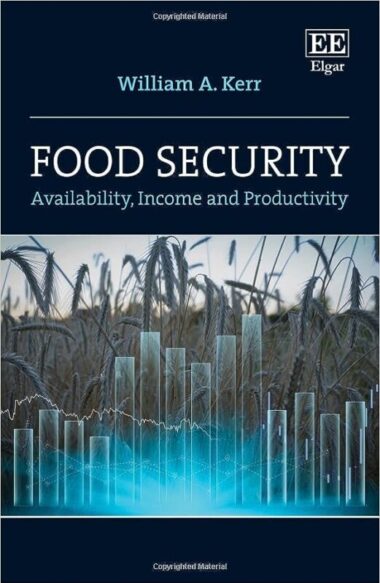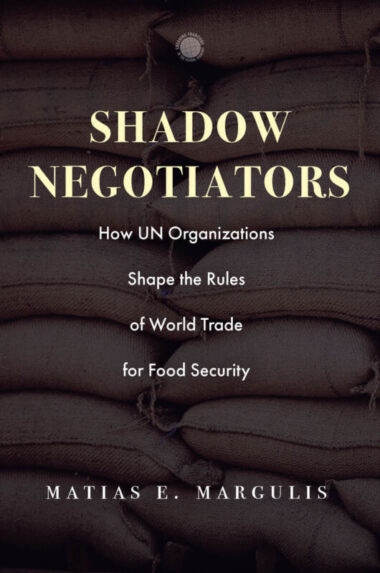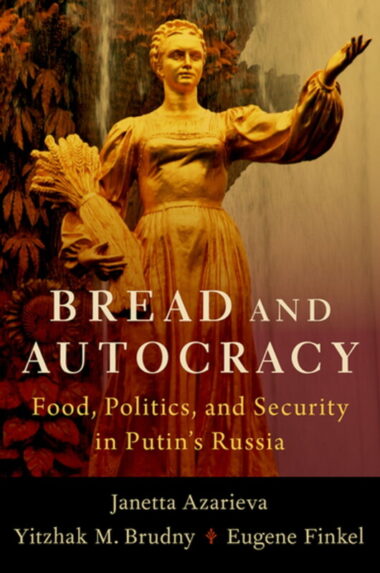I
n an era marked by unprecedented global challenges, few issues resonate as profoundly as the quest for food security. The Russian invasion of Ukraine and the grain shortage that followed showcased the grave vulnerability of existing systems. The imperative of ensuring that everyone, everywhere has access to safe, sufficient, and nutritious food looms large on the global stage. This month’s book bundle presents a curated selection of books that delve into food security, examining it from multiple angles, and offering insights, strategies, and solutions.
From the intricacies of international trade policies to the sustainability of food systems, and from the impacts of geopolitical conflicts to the strategic place of food, these books provide a comprehensive understanding of the challenges and opportunities in the realm of global food security.
Whether you are a policymaker, researcher, student, or simply a concerned global citizen, this collection provides valuable resources for understanding, navigating, and contributing to the discourse on global food security.
Food Security: Availability, Income and Productivity is a pertinent book that explores the pressing issue of global food security as our world population continues to grow. The author focuses on three key conditions necessary to achieve food security: food availability, adequate incomes, and increased agricultural productivity.
The book draws insights from history and contemporary contexts to thoroughly examine these conditions. It takes a close look at the obstacles preventing consistent food availability and discusses how to overcome these challenges. It also delves into the importance of ensuring sufficient incomes, highlighting programs like food stamps and food banks. Furthermore, the book provides valuable insights into the factors driving enhanced agricultural productivity.
Food Security caters to a broad audience, including agricultural experts, policymakers, and NGOs working in food aid. It’s also a valuable resource for students studying agriculture and public policy. The book not only informs but also encourages critical thinking about the complex task of feeding a projected nine billion people by 2050.
In a world where food scarcity is becoming increasingly worrisome, this book offers essential insights into the intricate web of food security. It provides a well-reasoned analysis that will contribute to ongoing discussions and efforts aimed at ensuring a sustainable food future for everyone.
William A. Kerr, Food Security: Availability, Income and Productivity (Edward Elgar Publishing, 2023) ISBN: 978 1 03531 270 2, 234 pages
Shadow Negotiators: How UN Organizations Shape the Rules of World Trade for Food Security by Matias E. Margulis is a groundbreaking exploration of the influence exerted by United Nations (UN) organizations within the World Trade Organization (WTO) despite their absence from the formal negotiation table. Margulis introduces the concept of “shadow negotiators,” illustrating how UN bodies strategically engage in political actions to shape multilateral trade negotiations.
The book’s primary focus is on the contentious issue of agricultural trade liberalization. It provides a detailed analysis of interventions by four UN organizations: the Food and Agriculture Organization (FAO), the World Food Programme (WFP), the Office of the High Commissioner for Human Rights (OHCHR), and the Special Rapporteur on the Right to Food (SRRTF).
Margulis unveils the innovative strategies these UN entities employ to influence global trade regulations. Importantly, he emphasizes that their motivation isn’t rooted in competition with the WTO or ideological opposition to trade liberalization. Instead, it stems from their concern that certain trade rules could negatively impact global food security, running counter to their core mission of addressing world hunger and safeguarding the right to food.
Shadow Negotiators is a meticulously researched work that offers fresh insights into the often-unseen dynamics of international trade. It’s essential reading for those interested in the intersection of trade policy and global welfare, making a valuable contribution to the field of international relations and trade studies.
Matias E. Margulis, Shadow Negotiators: How UN Organizations Shape the Rules of World Trade for Food Security (Stanford University Press, 2023) ISBN: 9781503633520, 292 pages
Universal Food Security: How to End Hunger While Protecting the Planet by Glenn Denning explores the path towards a world where hunger and malnutrition are eradicated, and everyone can access healthy and abundant food for a productive life. The book emphasizes the need to transform our food systems, focusing on sustainability and environmental restoration, from production to distribution.
Denning, drawing from his extensive experience in over fifty countries, offers a practical guide to making healthy diets accessible to all while ensuring sustainability. He identifies key priorities, including sustainable agriculture intensification, robust market infrastructure, responsible postharvest practices, promoting healthy eating, and establishing social safety nets. The book underscores the pivotal role of practitioner-leaders in driving this transformation, highlighting the importance of education and development in instigating change.
But beyond the roadmap, Denning reminds us that the engine driving this transformation is practitioner-leadership, underscored by education and development. This book stands as a testament to the potential for meaningful change when individuals and institutions commit to reshaping our world, making universal food security not merely a dream but a tangible and sustainable reality.
Glenn Denning, Universal Food Security: How to End Hunger While Protecting the Planet (Columbia University Press, 2023) ISBN: 9780231197618, 448 pages
The Russia-Ukraine Conflict and Global Food Security explores the global food security implications of Russia’s invasion of Ukraine in February 2022, which occurred during a period of already high food prices due to the COVID-19 pandemic. The book highlights the importance of the Black Sea region for global food production and Russia’s role in supplying natural gas and fertilizers.
The potential disruption of trade in this region posed a significant threat, with the potential to raise food prices and worsen poverty and hunger in vulnerable countries. The conflict primarily impacted trade in cereals and vegetable oils, fertilizer exports, and energy costs, potentially pushing millions into hunger and poverty.
The International Food Policy Research Institute (IFPRI) responded swiftly by providing information and policy advice. They established a blog series and online resources to disseminate critical information rapidly. This book compiles these blog posts, offering an overview of the crisis’s progression, international responses, and lessons for ensuring food security in the wake of disruptions.
This book provides essential insights into a rapidly evolving crisis with far-reaching implications for global food security, making it valuable for policymakers and researchers.
Joseph W. Glauber, Ed. and David Laborde Debucquet. Ed., The Russia-Ukraine Conflict and Global Food Security (IFPRI, 2023) ISBN: 9780896294394, 196 pages
Bread and Autocracy: Food, Politics, and Security in Putin’s Russia offers a compelling analysis of the pivotal role food has played in Russian politics from the 1917 Revolution to the present under Putin’s leadership. The authors, Janetta Azarieva, Yitzhak M. Brudny, and Eugene Finkel, argue that Russia’s transition from a grain importer to a global food exporter was a deliberate, long-term strategy aimed at enhancing national security and regime stability. This focus on food self-sufficiency sets Russia apart from other autocracies, as it prioritizes domestic food production over imports, highlighting its significance in maintaining autocratic rule.
The book’s relevance is heightened in today’s world, where food issues are once again at the forefront of global concerns and nations are emphasizing self-reliance. Bread and Autocracy provides a timely and comprehensive exploration of Russia’s unique approach to food politics, shedding light on its implications for both domestic and international affairs. It is a valuable read for those seeking a deeper understanding of Russia’s distinctive stance on food and its impact on political power. The book will be available in hardcover on September 1, 2023.
Janetta Azarieva, Yitzhak M. Brudny, and Eugene Finkel, Bread and Autocracy: Food, Politics, and Security in Putin’s Russia (Oxford University Press, 2023) ISBN: 9780197684368, 525 pages
Recommended










